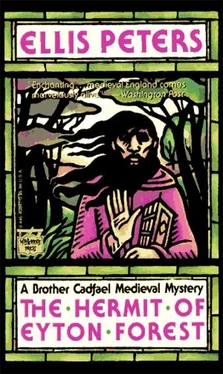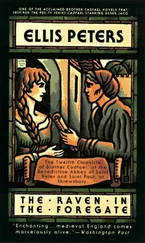Fulke Astley was left hesitant, eye to eye with Hugh, and unsure whether it would serve him better to attempt explanations and justification, or to withdraw—if he was allowed to withdraw—in dignified silence, or at least with as few words as possible, and no concessions.
“Tomorrow, then, my lord,” he said, settling upon brevity, “I shall be at Cuthred’s hermitage as I have promised.”
“Good! And you might do well,” said Hugh, “to acquaint the hermit’s patroness with what’s mooted against him. She may wish to be present herself. As at this time, my lord, I have no more immediate need of you. And should I have need in the future, I know where to find you. You may have good reason to be glad that Richard slipped his collar. Mischief undone is best forgotten. Provided, of course, there’s no further mischief in contemplation.” Of that Fulke made the best he could. With a curt reverence to the abbot he turned to reclaim his horse, mounted, and rode out at the gatehouse at a deliberate and stately walking pace.
Brother Cadfael, summoned to join the colloquy in the abbot’s lodging after supper, turned aside on his way, on a sudden impulse, and went into the stable yard. Richard’s black pony was contented and easy in his stall after his strenuous ride, groomed and watered and placidly feeding. But the big chestnut with the white blaze down his forehead was gone from his place, saddle and harness and all. Whatever the occasion for his silent departure, Rafe of Coventry had ridden forth on some local errand of his own. Richard sat on a low stool at the abbot’s knee, washed and brushed and meekly grateful to be home, and told his story, or as much of it as he felt justified in telling. He had an interested audience. There were present, besides the abbot, Hugh Beringar, Brother Cadfael at Hugh’s accepted request, and Brother Paul, still reluctant to let the returned prodigal out of his sight. Richard had tolerated, even enjoyed, being shaken, slapped, scrubbed and made much of, the whole chaotic process which had produced this neat, shining schoolboy for the abbot’s inspection. There were gaps in his story, and he knew they would be questioned, but Radulfus was of noble family, and would understand that a nobleman cannot betray those who have helped him, or even certain underlings who at the instance of their masters have injured him. “Would you know them again, the two who captured you and took you into Wroxeter?” asked Hugh.
Richard considered the tempting prospect of revenge on the strapping young fellow who had laughed at his struggles and hindered him at the ford, but rejected it reluctantly as unworthy of his nobility. “I couldn’t be sure of them. It was getting dark.” They did not press him. Instead, the abbot asked: “Had you help in escaping from Leighton? You could hardly have broken out on your own, or you would have done it earlier.”
Answering that presented something of a problem. If he told the truth it would certainly do Hiltrude no harm here among his friends, but if ever it reached her father it could do her harm enough. Better stick to the story as she must have told it, that the door had been mistakenly left unbolted, and he had made his own way out. Cadfael observed the slight flush that mantled in the boy’s well-scrubbed cheeks as he recounted that part of his adventures, with notable brevity and modesty. If it had been true he would have been exulting in it. “He should have known what a slippery fish he had caught,” said Hugh, smiling. “But you still have not told us why you rode out from the abbey in the first place, nor who told you that the hermit is not the priest he purports to be.” This was the crux, and Richard had been thinking about it with unaccustomed labour and pain while he submitted to Brother Paul’s affectionate homily on obedience and order, and the evil consequences to be expected from transgressing their rules. He looked up warily into the abbot’s face, shot an uneasy glance at Hugh, whose reactions as the secular authority were less calculable, and said earnestly: “Father, I said I would tell you, but I did not say I would tell any other. There is someone who might be harmed if I told what I know of him, and I know he has not deserved it. I can’t bring him into danger.”
“I would not wish to make you break faith with any man,” said Radulfus gravely. “Tomorrow I’ll hear your confession myself, and you shall tell me then, and rest happy that you’ve done right, and your confidence is sacred. Now you’d best get to your bed, for I fancy you need it. Take him away, Paul!” Richard made his ceremonial reverences, glad to have got off so lightly; but as he passed where Hugh sat he hesitated and stopped, plainly with something still on his mind.
“My lord, you said everyone at Leighton said I had never been there, of course they’d be afraid to say anything else. But did Hiltrude say so?” Hugh could make connections perhaps faster than most men, but if he instantly made this one he gave no sign of it. With respectful gravity and a blank countenance he said: “That’s Astley’s daughter? I never spoke with her, she was not in the house.”
Not there! So she did not have to lie. She must have slipped out discreetly as soon as her father was gone. Richard said a relieved and grateful goodnight, and went away to his bed with a lightened heart.
“She let him out, of course,” said Hugh as soon as the door had closed after the boy. “She was a victim no less than he. Now I begin to see a pattern. Richard is seized as he rides back through Eyton forest, and what is there in Eyton forest and along that path but Eilmund’s cottage and the hermitage? And to the hermitage we know he did not go. And who should walk into Shrewsbury about noon this day and send me off hotfoot to Leighton, which otherwise I should not have reached before tomorrow, but Eilmund’s girl? And where she got the news she never clearly said, but some passing villager had said he’d seen a boy there who might well be Richard. And Richard, more forthrightly, will not say why he went off there alone, nor who told him the hermit is no true priest. Father, it seems to me that someone—let’s not go so far as to name him!—has very good friends among our acquaintance. I hope they are as good judges! Well, tomorrow, at any rate, there’ll be no hunting. Richard is safely home with you. And to tell truth, I doubt the other quarry will ever be flushed out of cover. Tomorrow our morning business is laid down for us. Let’s first see that resolved.”
As soon as Prime was over they mounted and rode, Abbot Radulfus, Hugh Beringar and Brother Cadfael, who in any case was bound for Eilmund’s cottage that day, to see how the forester was progressing. It was by no means the first time he had adjusted his legitimate visits to accommodate his reasoned curiosity. That he could count on Hugh to abet his plans was an added advantage, and an additional witness with a sharp eye for the infinitesimal changes by which the human countenance betrays itself might be invaluable in this encounter. The morning was clearer of mist than in recent days, there had arisen a steady, drying wind that was crisping the fallen leaves in the forest rides, and colouring in muted gold those that still hung on the trees. The first frost would set the crowns of the forest blazing in russets and browns and flame. Another week or two, thought Cadfael, and there’d be no shelter for Hyacinth in the trees when inconvenient visitors came to the cottage, even the oaks would be half-naked. But in a few more days, God willing, Aymer would have abandoned his revenge, cut his losses, and made off in haste to secure his gains at home. His father’s body was safely coffined, and though he had only two grooms with him, there was also Drogo’s good horse as a remount for a new master in a hurry, and he would find no difficulty in hiring litter bearers at every way-stage on his journey. He had already scoured the whole region without success, and showed distinct signs of fretting between two desired ends, of which surely the more profitable would win in the end. Hyacinth’s freedom might be nearer than he knew. And he had already served and deserved well, for who else could have got word to Richard that the hermit was not all he claimed to be? Hyacinth had travelled with him, known him well before he ever set foot in Buildwas. Hyacinth might well know things about his reverend master that were known to no one else.
Читать дальше












